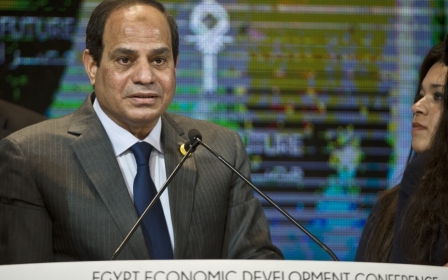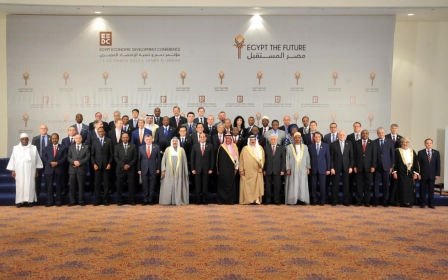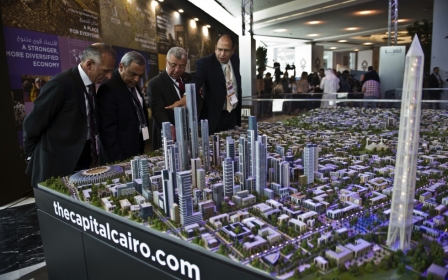Egyptians promised a future worth billions
SHARM EL-SHEIKH, Egypt - Egypt's Sharm el-Sheikh over the weekend hosted a conference where $60bn was said to be injected in the country's economy for projects that are planned to alter its fate.
Residents of the Red Sea resort say the glamour the coastal city witnessed over the past few days was a first since Hosni Mubarak was toppled in 2011.
Dolled up to host a three-day conference attended by high-profile figures in the world of business and political leaders from across the globe, the South Sinai city was brought to an immaculate state to mirror the event's catchphrase: Egypt the Future.
"The changes were so fast it was like they happened overnight," said taxi driver Abdel-Hamid. "They didn't just dust the roads, or mop them - they built new ones. They [the officials] are serious about making this happen," he said.
The conference, also called Egypt Economic Development Conference (EEDC), was advertised as a turning point for Egypt's economy, which has been recovering after years of political turbulence pushed it to its slowest pace of growth in two decades. Having promised Egyptians to recover the economy, President Abdel Fattah al-Sisi placed his bets on the event as a starting point.
The country of over 80 million people, the largest in the Arab world, was set to dazzle guests with a glitzy city and dozens of investment opportunities to lure back the foreign exchange that has fled its markets.
Set to impress
To impress more than 1,500 guests who flew in from 62 countries, the government spent 100 million Egyptian pounds ($13.1mn) to gear up Sharm el-Sheikh for the big occasion. This brought to the foreground the stark contrast between the city and the rest of Egypt, where pollution, chaos, bombings and worn-out infrastructure are part of everyday life.
Streets connecting the city's attractions and hotels had no sign of the potholes emblematic of road networks across the rest of Egypt. Freshly painted roads and curbs were decorated with lines of palm trees, rows of colourful flowers and neatly trimmed grass - nothing like the overall dusty, grim-looking facade of Egypt.
Banners flagging the event's catchphrase were found everywhere, from the airport's lounges to hotel lobbies, and on chocolate bars served on flights of the national flagship's airlines. Images of Sisi, under whose auspices the conference was taking place, dotted the sides of roads. Solar panels powered light poles across the city.
Cab drivers were made to wear uniforms the government paid for, said Alaa, a cab driver dressed in a navy-blue suit and a shirt of a lighter shade and a matching tie.
"The new governor instructed us to be on our best manners. After all, we're the first people the visitors see and the last ones they bid farewell to before flying home," he said, explaining that each driver was handed a full suit to wear for work, for which they paid only a fifth of its cost.
Clusters of police officers and masked special forces were spread across the city, closely watching passersby. Helicopters constantly hovered in the skies, an indication of the unstable security situation in the country.
Bomb attacks happen almost daily across the country, and in North Sinai, a mere 700km to the north of Sharm el-Sheikh, the army faces a surge in insurgency that has harmed native residents of that region.
Pledged billions
Impress is what the government did. According to Prime Minister Ibrahim Mehleb, a total of $60 billion was reaped in pledges of direct investments or soft loans over the course of three days - a figure that by far exceeds the stated goal of between $10bn and $12bn, disclosed by the investment minister days before the conference was launched.
The larger chunk of the pledges were made by Egypt's allies in the Arabian Gulf, who have put their weight behind Sisi to rid the country of his predecessor and ex-boss, Mohamed Morsi, due to his membership in the Muslim Brotherhood, which they deemed a risk to their rule.
Saudi Arabia, whose late King Abdullah bin Abdulaziz had called for the summit in 2013; the UAE, whose Minister of State Sheikh Sultan al-Jaber was a member of the conference's steering committee; as well as Kuwait announced $4bn each to boost Egypt's economy on the first day of the summit.
Gulf investors were also part of key projects, including a $45bn project to develop Egypt's new administrative capital to the east of Cairo. The developer of the project is Capital City Partners, a private real estate fund that was co-founded by UAE's Mohamed Alabbar, who built the world's tallest building, Dubai's Burj Khalifa.
A miniature of the city, which was not publicly discussed prior to the summit, included skyscrapers, and a theme park that is planned to be four-times the size of Disneyland, and a building modeled on France's Eiffel Tower.
"If a conference could bring in all these people, imagine what one of these projects could do" to the economy, said Sayed, who worked in one the restaurants in the city's Naema Bay.
"Even if little of it trickled through to us, it would still be better than what we had. It would be like the days of Mubarak," who he said "had the lion's share of the country's wealth with his businessmen and we still managed to make a good living."
Tourism has suffered a massive blow since 2011. Around 14.7 million tourists stayed in hotels in Egypt a year before the revolt, as opposed to 9.5 million in 2013, harming residents of cities like Sharm el-Sheikh, whose bread and butter comes from tourism.
Inclusive growth
Egypt's economic growth in 2010 was seven percent, which did not deter millions of Egyptians from protesting against Mubarak due to their dissatisfaction at the unequal distribution of wealth in their country.
With more than a quarter of the Egyptian nation living in poverty, and unemployment rates in the double digits, talks of billions of dollars being injected into the country means very little unless it creates jobs, improves living conditions and reduces poverty.
In her speech at the conference, managing director of the International Monetary Fund Christine Lagarde asked: "Is higher growth enough?"
"We know from our studies that to be sustainable, growth has to be inclusive. That means making sure that all Egyptians have opportunities: youth, women, the disabled, people who would like to access employment. It also means social spending on health and education."
In an interview with the Daily News Egypt, Mohamed el-Erian, an economic advisor at Allianz and member of Sisi's council of experts, said he noticed "very high attention" paid by the government to inclusive growth, and its "very high awareness" of the sectors' issues such as healthcare and education.
But Tamer, a vendor at a bazaar, said he was not so sure.
"We've heard of billions of dollars provided by the Gulf [states] for two years now and have seen nothing. Now it seems like they're buying our land, and we have no say in it," he said.
Adding that "the situation will surely get better," he said he wondered if "welfare will be fairly distributed or will we be given the crumbs? I don't know."
‘Another Kofta device’
Another cab driver, who goes by the name Samara, said the whole event was another "Kofta device," referring to a set of appliances the army claimed to have invented last year with an ability to detect and cure AIDS, hepatitis and other diseases.
The announcement, which was mocked by activists in Egypt and discredited by scientists worldwide, was fiercely defended by supporters of Sisi and pro-regime media personnel.
"It’s another one of those lies," he said. "One big show, like the one million housing units low-income Egyptians were promised, but never took place. This too will not happen. The poor will remain poor, and the rich ones will grow richer."
In another stark contrast with reality, neatly dressed men and women joined Sisi on stage in his closing statement to represent Egypt's youth, almost half of whom are poor.
"Egypt needs at least $200-$300 billion to (develop). I know Egypt and its problems. Egypt needs at least $200-$300 billion so that there is real hope for the 90 million," Sisi said.
New MEE newsletter: Jerusalem Dispatch
Sign up to get the latest insights and analysis on Israel-Palestine, alongside Turkey Unpacked and other MEE newsletters
Middle East Eye delivers independent and unrivalled coverage and analysis of the Middle East, North Africa and beyond. To learn more about republishing this content and the associated fees, please fill out this form. More about MEE can be found here.




